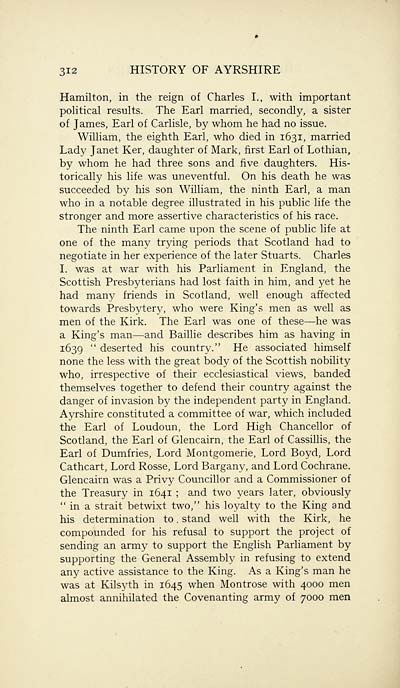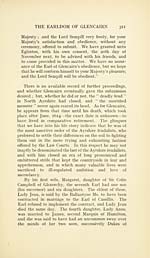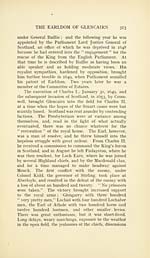Download files
Complete book:
Individual page:
Thumbnail gallery: Grid view | List view

312 HISTORY OF AYRSHIRE
Hamilton, in the reign of Charles I., with important
political results. The Earl married, secondly, a sister
of James, Earl of Carlisle, by whom he had no issue.
William, the eighth Earl, who died in 163 1, married
Lady Janet Ker, daughter of Mark, first Earl of Lothian,
by whom he had three sons and five daughters. His-
torically his life was uneventful. On his death he was
succeeded by his son William, the ninth Earl, a man
who in a notable degree illustrated in his public life the
stronger and more assertive characteristics of his race.
The ninth Earl came upon the scene of public life at
one of the many trying periods that Scotland had to
negotiate in her experience of the later Stuarts. Charles
I. was at war with his Parliament in England, the
Scottish Presbyterians had lost faith in him, and yet he
had many friends in Scotland, well enough affected
towards Presbytery, who were King's men as well as
men of the Kirk. The Earl was one of these — he was
a King's man — and Baillie describes him as having in
1639 " deserted his country." He associated himself
none the less with the great body of the Scottish nobility
who, irrespective of their ecclesiastical views, banded
themselves together to defend their country against the
danger of invasion by the independent party in England.
Ayrshire constituted a committee of war, which included
the Earl of Loudoun, the Lord High Chancellor of
Scotland, the Earl of Glencairn, the Earl of Cassillis, the
Earl of Dumfries, Lord Montgomerie, Lord Boyd, Lord
Cathcart, Lord Rosse, Lord Bargany, and Lord Cochrane.
Glencairn was a Privy Councillor and a Commissioner of
the Treasury in 1641 ; and two years later, obviously
"in a strait betwixt two," his loyalty to the King and
his determination to . stand well with the Kirk, he
compounded for his refusal to support the project of
sending an army to support the English Parliament by
supporting the General Assembly in refusing to extend
any active assistance to the King. As a King's man he
was at Kilsyth in 1645 when Montrose with 4000 men
almost annihilated the Covenanting army of 7000 men
Hamilton, in the reign of Charles I., with important
political results. The Earl married, secondly, a sister
of James, Earl of Carlisle, by whom he had no issue.
William, the eighth Earl, who died in 163 1, married
Lady Janet Ker, daughter of Mark, first Earl of Lothian,
by whom he had three sons and five daughters. His-
torically his life was uneventful. On his death he was
succeeded by his son William, the ninth Earl, a man
who in a notable degree illustrated in his public life the
stronger and more assertive characteristics of his race.
The ninth Earl came upon the scene of public life at
one of the many trying periods that Scotland had to
negotiate in her experience of the later Stuarts. Charles
I. was at war with his Parliament in England, the
Scottish Presbyterians had lost faith in him, and yet he
had many friends in Scotland, well enough affected
towards Presbytery, who were King's men as well as
men of the Kirk. The Earl was one of these — he was
a King's man — and Baillie describes him as having in
1639 " deserted his country." He associated himself
none the less with the great body of the Scottish nobility
who, irrespective of their ecclesiastical views, banded
themselves together to defend their country against the
danger of invasion by the independent party in England.
Ayrshire constituted a committee of war, which included
the Earl of Loudoun, the Lord High Chancellor of
Scotland, the Earl of Glencairn, the Earl of Cassillis, the
Earl of Dumfries, Lord Montgomerie, Lord Boyd, Lord
Cathcart, Lord Rosse, Lord Bargany, and Lord Cochrane.
Glencairn was a Privy Councillor and a Commissioner of
the Treasury in 1641 ; and two years later, obviously
"in a strait betwixt two," his loyalty to the King and
his determination to . stand well with the Kirk, he
compounded for his refusal to support the project of
sending an army to support the English Parliament by
supporting the General Assembly in refusing to extend
any active assistance to the King. As a King's man he
was at Kilsyth in 1645 when Montrose with 4000 men
almost annihilated the Covenanting army of 7000 men
Set display mode to:
![]() Universal Viewer |
Universal Viewer | ![]() Mirador |
Large image | Transcription
Mirador |
Large image | Transcription
Images and transcriptions on this page, including medium image downloads, may be used under the Creative Commons Attribution 4.0 International Licence unless otherwise stated. ![]()
| Histories of Scottish families > Ayrshire > Volume 2 > (322) Page 312 |
|---|
| Permanent URL | https://digital.nls.uk/95192962 |
|---|
| Attribution and copyright: |
|
|---|---|
| Description | A selection of almost 400 printed items relating to the history of Scottish families, mostly dating from the 19th and early 20th centuries. Includes memoirs, genealogies and clan histories, with a few produced by emigrant families. The earliest family history goes back to AD 916. |
|---|

